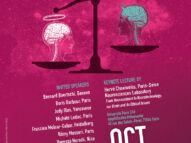events, seminars
December 2, 2022 – Gabriel Lepousez (Perception and Memory Laboratory, Pasteur Institute) – How brain circuits sense and integrate peripheral immune signals
Upon infection, bacterial compounds, and the pro-inflammatory cytokines they elicit, induce a complex response coordinated by the brain and known as “sickness behavior”. This response induces stereotyped behavioral changes (reduced locomotion and food intake, social avoidance), metabolic adjustments (fever, glycemia),… Continue reading
events, seminars
9 Décembre 2022 – Jean-Michel Perrin (Institute of Biology Paris-Seine) – Reconstructing rodent and human neuronal networks to model neurodegenerative syndromes
Human brain is a complex organ composed of several hundred billions of cells and even more numerous interconnected cellular interactions. There is a high demand for experimental models to study these interactions in various contexts, ranging from cognitive sciences… Continue reading
events, seminars
October 28, 2022 – Christophe Bernard (Institute for Systems Neuroscience, Aix-Marseille University) – The timescale dynamics of epilepsies: from seconds to decades
Continuous long-term recordings (months to years) in patients with epilepsy directly show that seizures are regulated not only in a circadian manner, but also on a much slower time scale (days to weeks). They strongly suggest the existence of specific… Continue reading
events, seminars
October 14, 2022 – Anne-Noël Samaha (University of Montreal) – Addiction to cocaine: How you take the drug is more decisive than how much
Exceptionally this seminar will take place in Salle des thèses (3rd floor) – Saint-Germain-des-Prés Campus, 45 rue des Saints Pères, 75006 Paris
A widely used preclinical procedure to study features of cocaine addiction involves allowing laboratory animals to take drug… Continue reading
events, seminars
October 7, 2022 – Fekrije Selimi (Collège de France, Paris)- The developmental history of the molecular synaptic code controlling excitatory connectivity
The mature brain results from the formation of precise networks between functionally and morphologically distinct types of neurons. A given neuron forms synapses with a limited number of partners and on precise subcellular localizations. Understanding what controls this specificity is… Continue reading
events, INC Meetings
October 20, 2022 – INC Day 2022 – Neuroethics
This year, the INC Day, organized in partnership with the masters programs BioMedical Engineering – Paris and NeuroParis and supported by the Faculty of sciences of Paris Cité University and the Graduate school Psychological science, is dedicated to ethics. What… Continue reading
events, seminars
September 30, 2022 – Valeria Cavalli (Washington University School of Medicine, USA) – Satellite Glial Cells in sensory nervous system health, injury and disease
Exceptionally this seminar will take place in Salle des thèses (3rd floor) – Saint-Germain-des-Prés Campus, 45 rue des Saints Pères, 75006 Paris
Research in my laboratory focuses on elucidating the principles and mechanisms by which peripheral nervous system neurons regenerate,… Continue reading
events, seminars
September 23, 2022 – Sébastien Bouret (ICM, Paris) – Neural basis of decision-making in primates. In the lab and beyond
The presentation will cover the cognitive and neurobiological functions underlying cost-benefits decision making in primates. After covering data from laboratory experiments, I will present recent studies aimed at understanding how these data can help understand how specific neuro-cognitive operations allow… Continue reading
events, seminars
September 16th, 2022 – Sebastian Jessberger (University of Zurich) – Mechanisms of life-long stem cell activity in the mammalian brain
Neural stem cells generate new neurons throughout life in the mammalian hippocampus. This process, called adult neurogenesis, is critically involved in certain forms of learning and memory. In addition, failing or altered neurogenesis has been associated with a number of… Continue reading
events, seminars
June 24th, 2022 – Pierre Paoletti (Institute of Biology of ENS, Paris) – New lights on neurotransmission: from molecular optogenetics to excitatory glycine receptors
The function of the human brain and its remarkable capacity for information storage and experience-dependent change hinge on the dynamics of chemical synapses – main ‘contact points’ between neurons. My team has a long-standing interest in studying the molecular principles… Continue reading

